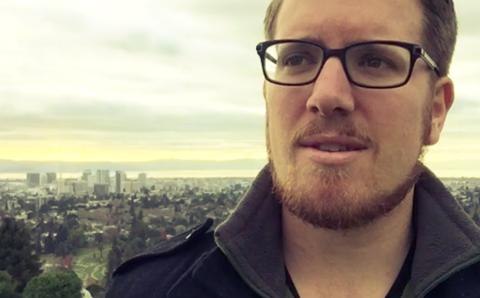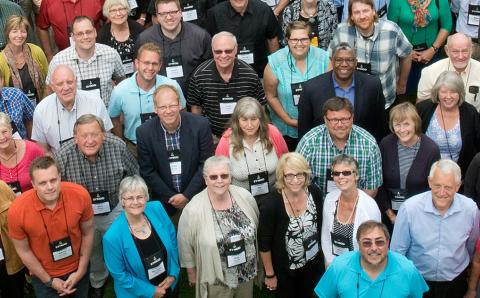Rev. Pedro Aviles warned that there are storms headed toward the Christian Reformed Church. Dr. Anthony Carter said that God walks on storms. Rev. Charles Kim said that in the new heaven and earth there will be no more storms, no more seas.
They were all speaking at Engage 2016, this year’s multiethnic conference held in June at Calvin College in Grand Rapids, Mich. The conference drew participants of many cultures, including African American, Hispanic, Chinese, Korean, Anglo, and Native American
After the opening event, which focused on lament for wrongs past, the rest of the conference focused on moving forward, even when the seas are rough.
Aviles, pastor of Ebenezer CRC in Berwyn, Ill., said, “There is a storm hitting our church. A gender storm, a generational storm, a financial storm, and a secularism storm. We need to be a weather-watching people. The storm disrupting our lives and our churches will shape our future.” God took 70 years to bring the people of Israel back to him in Jeremiah’s day, he said. “How long will the CRC be in this storm? It’s going to get worse before it gets better,” he added. “Some of us are not desperate enough yet to seek him desperately. We have flipped the great commandment. Loving our neighbor has become more important than loving our God. Make first things first, your first love your first love.”
Dr. Anthony Carter also talked about storms. In a week that saw tropical storm Colin make landfall in Florida, Carter said, “God doesn’t name storms. He walks on them.” For that reason, he said, people need to get past their fear.
Lack of diversity is based in fear, he said. “Fear amongst majority culture that if diversity happens, they will lose the blessing. This is what keeps us from doing the things God calls us to do.” He said that his African American congregation is getting more and more white and hispanic. “[People] fear that music will change, fear that people who don’t look like [them] will preach, fear that we won’t sing [their] favorite song any more.”
Carter said that violence, whether in the street or in the womb, comes from fear.
Rev. Charles Kim, Korean ministries coordinator for the CRC, continued with that theme of seas and storms. Pointing to John’s vision in Revelation 21, he noted there will be no more seas. In that culture, he said, “The sea meant exile, separation, chaos. So this new place is no more of that.”
Instead of separation and chaos, the new city will be the ultimate fulfillment of God among us. “We need to let God be among us. This reality of new heaven and new earth, although it’s not here yet, we get a glimpse today.”
One way to get those glimpses, he said, is through the sharing of food. In sharing hospitality and food, cultures are unveiled. He challenged participants to eat each week with someone not like them, to eat foods that aren’t familiar, and to hear the stories of the culture behind those foods.
Dr. Christena Cleveland, a fifth-generation minister, used a story to illustrate how to overcome the violence of the heart that fear can cause.
She told of a class she taught that three young white men had to take. “They sat in the front row every day, just to cause problems,” she said. “They talked loudly the entire time to undermine me, asked questions to try to make me look stupid, which is hard to do!”
But over time, even though she was polite and gracious, it wore down her heart. “In my heart I was responding to their violence with violence. So I started this exercise, as soon as they filed in. ‘The image of God in me embraces the image of God in you,’” she said. “Though the violence never stopped, my response became love and hope and grace and forgiveness and truth.”
But overcoming the fear that prevents unity can openly happen when there is mutual unity. “We’re joking if we think we can experience unity in a church where some people have more power than others, more voice than others.”
She pointed to Jesus, who was in a power position as a male and a Jew. “Jesus had a plan. He understood the power differential between him and us, inviting us into the Trinity. It meant that he had to leave privileged space.” She noted that Jesus strategically brought attention to those on the margins rather than those in power.
She noted, however, that actions of people in positions of power are not necessary to what God is doing in the church now, any more than in Jesus’ time. “I love it when they get involved. It’s good for them and great to have more partners,” she said. “This is the cross and resurrection way. You’re invited to be part of it on those terms, which means you’ll be last, which is an important place to be. The movement is happening, and we can invite people in.”
All photos by Dan Cooke
About the Author
Gayla Postma retired as news editor for The Banner in 2020.









